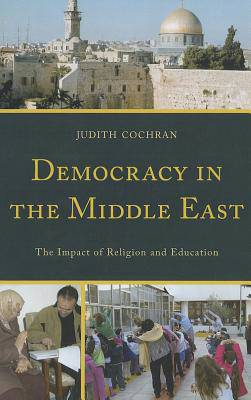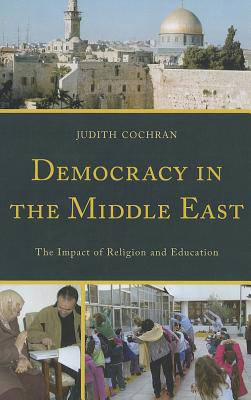
- Retrait gratuit dans votre magasin Club
- 7.000.000 titres dans notre catalogue
- Payer en toute sécurité
- Toujours un magasin près de chez vous
- Retrait gratuit dans votre magasin Club
- 7.000.0000 titres dans notre catalogue
- Payer en toute sécurité
- Toujours un magasin près de chez vous
Democracy in the Middle East
The Impact of Religion and Education
Judith Cochran
Livre relié | Anglais
117,45 €
+ 234 points
Format
Description
Income inequality throughout the Middle East is best addressed through effective education. In our highly technological, globalized economy, people without education will not be able to improve their economic situations. The interaction among religions, education and political control in contemporary Middle East is profiled through interviews with media, political, religious and educational leaders along with classroom observations and competency measures of graduates. This never-before documentary is important for those who have a vested interest in the economic and social health of the Middle East.
Without a strong educated citizenry, the democratic future of any country is in jeopardy. Beginning with a history of religious education through to contemporary institutions enables readers to understand existing conditions throughout the Middle East. Ancient Jewish, Christian and Muslim religions expand their impact through the control of their religious and educational systems. Initially training judges, religious leaders and converts, religious schools became the bedrock of education throughout the region. Building on interlocking monotheistic religious histories, this work demonstrates how political forces unknowingly began to build elements of democracy through increasing access to education and technology, secularizing content, and allowing ethnic communities to control their believers through religious education of their leaders. Lebanon, Syria, Palestine, Israel, Jordan and Egypt are then profiled according to the development of aspects of democracy: increasing access to education, enjoyment of basic freedoms, justice, dignity of self, and the right for all to be free of discrimination. Lebanon supports freedom of choice for citizens as most parents can and do choose to educate their children in a plethora of private rather than government schools. Syria, recognizing the importance of education, provides education for all including Iraqi, Afghani and Palestinian refugees at a great cost to its own citizens. Jordan favors university access for rural, royal, and Arab Jordanians, particularly from less academically strong schools, and limits access for qualified Palestinians. This book provides insights from researchers, interviews with students, teachers, administrators and classroom observations in private, public and refugee camp schools. Political, social and media leaders discuss the status of education and religion in their countries. Furthermore, the competencies of graduating students indicate the developing intellectual and technological force of youth in the Middle East. These are the students who are becoming the basis of the economic, religious and democratic future of the region.Spécifications
Parties prenantes
- Auteur(s) :
- Editeur:
Contenu
- Nombre de pages :
- 256
- Langue:
- Anglais
Caractéristiques
- EAN:
- 9780739122136
- Date de parution :
- 22-08-11
- Format:
- Livre relié
- Format numérique:
- Genaaid
- Dimensions :
- 155 mm x 229 mm
- Poids :
- 453 g

Les avis
Nous publions uniquement les avis qui respectent les conditions requises. Consultez nos conditions pour les avis.






